Have you received an email with the subject Your account is hacked. Your data is stolen. Learn how to regain access? The email alleges that a hacker has gained access to your operating system and your account by exploiting a Trojan virus. It also claims that they have been monitoring you, have access to all your contacts and correspondence, and have created a video showing compromising activities. They demand $1190 in Bitcoin to delete the video and cease further contact.
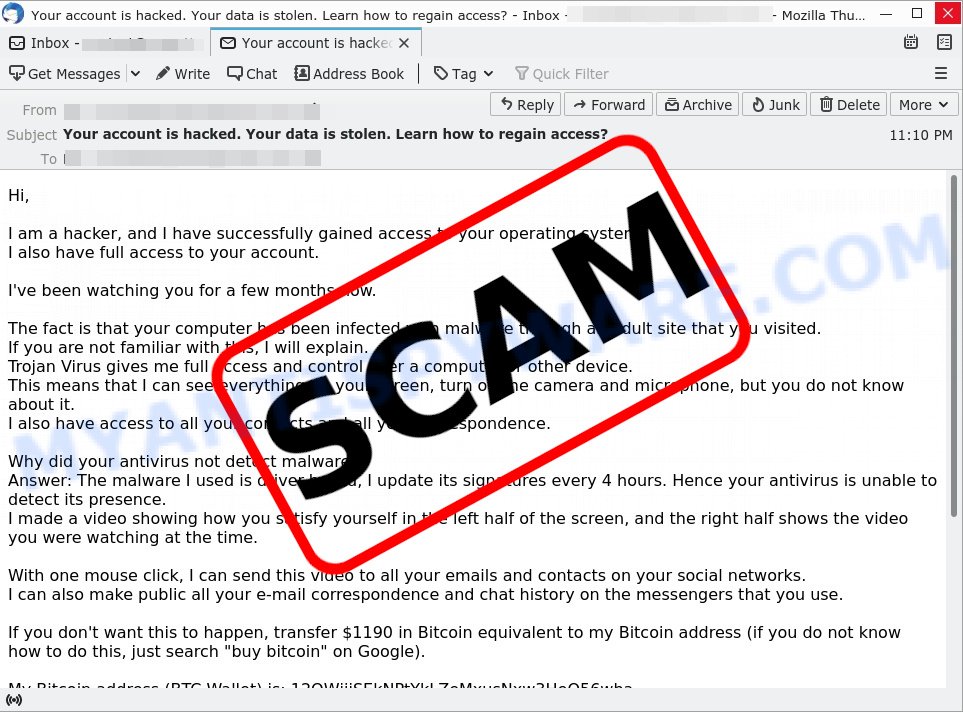
Question: Is it true that my system has been hacked, and do I need to pay them?
Investigation Findings: This type of email is commonly referred to as a “sextortion scam“. Typically, these claims are false; the scammer does not actually have access to your system. These emails aim to instill fear and coerce you into paying money.
Answer: The ‘Your account is hacked. Your data is stolen. Learn how to regain access?’ email is a deceptive scam. 💡 To protect yourself, do not respond to the email or send any money. Make sure your antivirus is up to date, and consider running a thorough system scan. It is advisable to change your email and system passwords for added security.
Table of Contents
🚨 Is the ‘Your account is hacked. Your data is stolen’ Email a Scam?
Yes, the email claiming that your operating system was hacked, your data stolen, and threatening to release compromising video unless you pay in Bitcoin, is definitely a scam. 🚫 If you’ve received such an email, exercise extreme caution. The claims are fabricated and designed to instill urgency, misleading you into paying money to the scammer.
A typical “Your account is hacked. Your data is stolen” scam email reads as follows:
Hi,
I am a hacker, and I have successfully gained access to your operating system.
I also have full access to your account.I’ve been watching you for a few months now.
The fact is that your computer has been infected with malware through an adult site that you visited.
If you are not familiar with this, I will explain.
Trojan Virus gives me full access and control over a computer or other device.
This means that I can see everything on your screen, turn on the camera and microphone, but you do not know about it.
I also have access to all your contacts and all your correspondence.Why did your antivirus not detect malware?
Answer: The malware I used is driver-based, I update its signatures every 4 hours. Hence your antivirus is unable to detect its presence.
I made a video showing how you satisfy yourself in the left half of the screen, and the right half shows the video you were watching at the time.With one mouse click, I can send this video to all your emails and contacts on your social networks.
I can also make public all your e-mail correspondence and chat history on the messengers that you use.If you don’t want this to happen, transfer $1190 in Bitcoin equivalent to my Bitcoin address (if you do not know how to do this, just search “buy bitcoin” on Google).
My Bitcoin address (BTC Wallet) is: 12QWjjiSEkNPtYkLZeMxusNxw3HeQ56wba
After confirming your payment, I will delete the video immediately, and that’s it. You will never hear from me again.
I will give you 50 hours (more than 2 days) to pay. I will get a notice, when you open this email, and the timer will start.
Filing a complaint somewhere does not make sense because this email cannot be tracked like my Bitcoin address.I never make any mistakes.
If I find that you have shared this message with someone else, the video will be immediately distributed.Best regards!
Background on the ‘Your account is hacked. Your data is stolen’ Email Scam:
This scam involves fraudsters sending emails that claim they have gained access to your operating system and have full control over your accounts. The scammers demand a ransom in Bitcoin to prevent the release of supposed video footage of you.
However, legitimate cybersecurity experts and organizations confirm that these claims are baseless. No real hacking has occurred; the email is designed to scare you into paying the ransom. Scammers often send these emails in bulk, hoping to catch unsuspecting victims.
The alarming spread of these scams has prompted various government and consumer protection agencies, including the FBI, to issue warnings. These agencies have reported that these scams have been widespread, using similar tactics to exploit individuals’ fears of privacy invasion and public embarrassment.
The fraudulent emails often claim they have hacked your account and threaten to share sensitive data unless you pay. They provide a Bitcoin wallet address for the payment and set a deadline to increase the urgency and pressure.
🚩 Red Flags to Watch Out For:
To protect yourself, be aware of these warning signs of the scam: 🔍🛡️
- 📧 Threats: Unexpected emails that claim your operating system was hacked and demand payment to prevent the release of compromising information.
- 💸 Ransom Demands: The scam includes demands for payment in Bitcoin, claiming it is the only way to prevent the release of the alleged footage.
- ⏳ Urgency and Imposed Deadlines: These emails impose a tight deadline to pressure you into acting hastily, using fear of embarrassment or reputational damage to coerce you into paying immediately.
- 🔄 No Evidence of Hacking: The email provides no real evidence that any hacking has occurred or that any sensitive data exists.
- 👤 Anonymity of the Sender: Scammers use anonymous email addresses and provide untraceable Bitcoin wallet addresses, making it difficult to verify the source.
- 🔗 Suspicious Claims: Be skeptical of any email that makes extraordinary claims about hacking and demands for money.
💡 Never respond to such emails or send money. Additionally, ensure your antivirus software is up to date. If you are concerned, run a virus scan on your device and change your email passwords for safety.
Understanding the ‘Your Account Is Hacked, Your Data Is Stolen’ Email Scam
If you receive an email that says “Your account is hacked. Your data is stolen“, it’s natural to feel shocked 🚨. These emails often start with intimidating statements designed to catch your attention right away. You might wonder, How could this happen? In truth, the sender has not accessed your system; their aim is to scare you into making a rash decision.
These emails feature unfounded threats, claiming to possess recordings or other compromising material that could embarrass you 🎥. The language used is deliberately unclear and threatening, meant to unsettle you: Could this really be happening?
The scammer may allege that they’ve installed advanced malware, such as a Trojan virus, on your device, claiming it allows them to see everything on your screen and access all your contacts 💻. A major indicator that this is a scam is the absence of any solid proof 🚩. They rely on the fear of sophisticated spying tools to intimidate you, not actual hacking skills.
The email usually ends with a request for payment 💰, with the scammer demanding a ransom in Bitcoin due to its anonymity. The scheme is crafted to pressure you into paying quickly. However, sending money does not ensure your safety and may even target you for additional scams.
Upon reading the email, you might wonder, Am I really at risk? or Can this person truly do what they claim? Typically, these threats are mere fabrications; they exploit your fears.
What should you do? It’s recommended not to reply to the scammer or send any money. Focus on fortifying your online security: update your passwords, make sure your devices are secured, and consider reporting to the authorities if the scam includes threats or extortion 🔐. Such incidents highlight the need for vigilance and proactive online security measures.
This scam relies on instilling fear and urgency to trick you. If you receive an email like this, do not interact with the scammer or transfer any money. Simply delete the email. Also, protect your computer with up-to-date anti-virus software, and use strong, unique passwords for all your accounts to help prevent falling victim to such scams.
Examples of such scams
Scammers have developed a variety of tactics to intimidate and exploit unsuspecting individuals. Here are a few common examples:
📹 I RECORDED YOU Email Scam
In this scam, the sender claims to have control over your camera and alleges they have recorded you during private moments. They typically demand payment to keep the footage private. Beware: this is a bluff to get you to pay up out of fear.
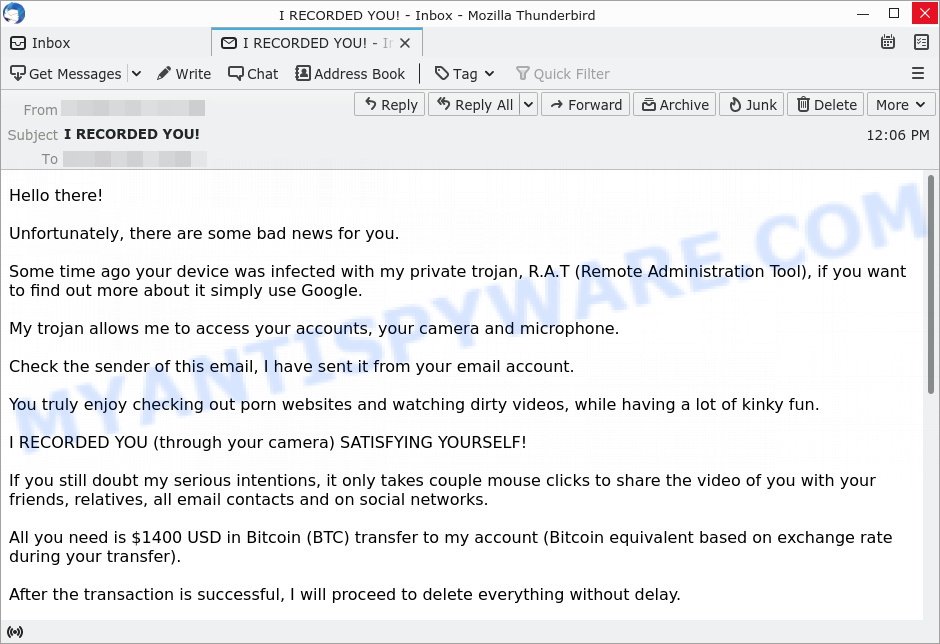
💼 I am a professional hacker EMAIL SCAM
Posing as a hacker, the sender of this email might say they’ve infiltrated your system. They may even claim they have proof of embarrassing activity and will publish it unless you send them money. Remember, a real hacker wouldn’t announce their presence—it’s a tactic to pressure you into paying.
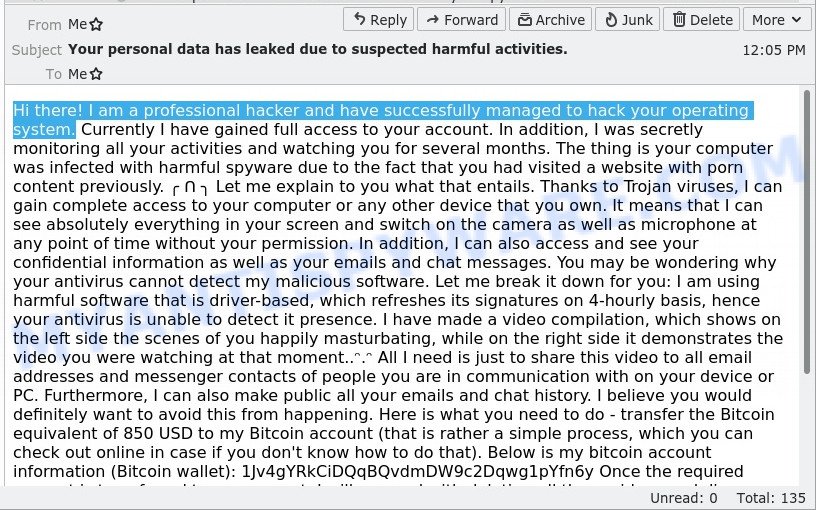
🔒 Your Private Information has been Stolen Email Scam
Here, the scammer will claim they’ve stolen sensitive information from you and threaten to release it unless you pay a ransom. They rely on the scare factor, hoping you’ll pay to protect your reputation, even though they likely have no data at all.
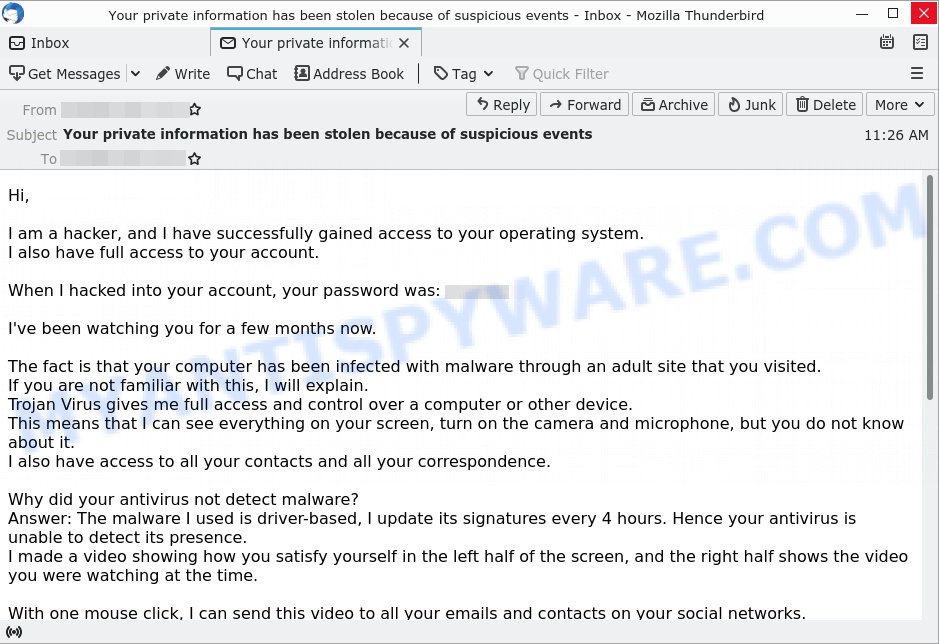
Each of these scams plays on fear and urgency to trick you into acting against your best interest. Always approach such emails with skepticism, verify your security, and do not engage with the scammers.
Should you send the money?
No, don’t give the scammer any money. It’s a scam, and giving them money will only encourage them to continue their criminal activities. Plus, if you pay once, they might target you again. To keep your personal information safe, always use strong and unique passwords for each of your accounts, enable two-factor authentication for an extra layer of security, and keep your computer’s antivirus software up to date. If you receive an email like this, it’s important to report it to the authorities and your email provider.
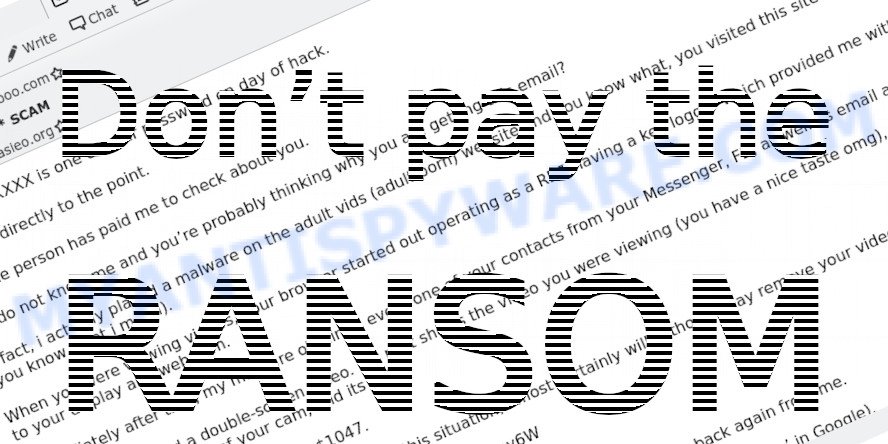
What to Do if You Get This Scam Email
Getting an email that says someone hacked your devices and has compromising information can be scary, but there are easy and safe ways to handle it.

Here’s what to do:
First, stay calm. The email is meant to scare you and make you act without thinking. Remember, it’s just a scam to make you feel afraid.
Don’t pay them. Paying won’t make the problem go away. It only shows the scammer that you are an easy target for future scams.
Don’t reply to the scammer. Responding can give them more information about you and confirm that your email is active, which could lead to more scams.
If the email mentions a password you recognize, check where it came from. Use sites like haveibeenpwned.com to see if your email or passwords have been part of a data breach.
Then, change your passwords. Use strong, unique passwords and set up two-factor authentication where you can.
For safety, run a full security scan on your device. The email’s claims about malware are usually false, but it’s good to make sure your system is clean.
Report the email to the authorities (like the FTC). Reporting helps with investigations and can stop these scams from happening to others.
Finally, tell others. Let your friends, family, and coworkers know about this scam so they can avoid it too. Sharing this information makes everyone safer.
Threat Summary
| Name | Your account is hacked Your data is stolen Email Scam |
| Type | Sextortion/Scareware |
| Ransom amount | $1190, $950, $890, $1490 (in Bitcoin equivalent) |
| Bitcoin Address | 12QWjjiSEkNPtYkLZeMxusNxw3HeQ56wba, 15NCWERN56DQNf4WiPLR2txgiEF2np5Q2g, 19eXNvqfdK7w8NVX1Db5o6GBYR1tcpWTKv, 13yQcMFQSf7ixzJrNceCDL4E1jVHEVqrcY |
| Fake Claims | Installation of malware through adult websites, access to personal data and device control, possession of a dual-view “sextape” |
| Damage | Psychological distress, potential financial loss if ransom is paid, privacy concerns |
| Distribution | Email campaigns targeting individuals who allegedly visited pornographic websites |
| Tactics | Inducing fear, creating urgency, threatening public exposure |
| Variations | Different ransom demands, various narrative styles in emails, inclusion of files like PDFs with threatening messages |
| Prevention Tips | Use strong, unique passwords; enable two-factor authentication; be skeptical of unsolicited emails; never pay ransoms; maintain updated antivirus software |
| Reporting Info | Forward to the Anti-Phishing Working Group at reportphishing@apwg.org; Report to Internet Crime Complaint Center (IC3) if in the US; Inform friends and family to prevent spread; Monitor accounts for unusual activity |
Conclusion
The “Your account is hacked. Your data is stolen.” email is a typical sextortion scam that uses fear to try to get money from you. The scammer claims they have gained full access to your operating system and accounts through malware installed from a site you visited. They threaten to release compromising videos and information unless you pay a ransom in Bitcoin. Remember, these threats are not real but are designed to scare you into paying.
Bottom Line: Ignore these emails. The best way to protect yourself is to not engage with the sender and to enhance your device security. 🛡️💻
Stay sharp and think critically; an email that triggers fear or promises dire consequences is probably a scam. 🤔
















